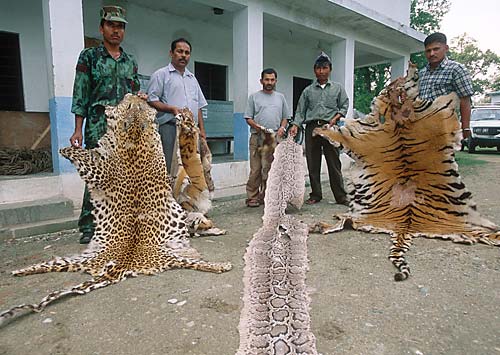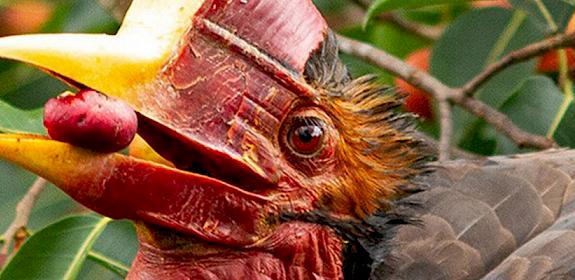South Asia forges consensus on wildlife enforcement network
Kathmandu, Nepal, 19th May 2010—Experts from South Asia have laid the foundation for a South Asia Wildlife Enforcement Network (SAWEN) as a co-ordinated regional response to combat illegal poaching and trafficking. Seven member countries agreed to the establishment of a secretariat and an outline work programme for the network.

The historic First Meeting of the South Asia Experts Group on Illegal Wildlife Trade was concluded here today with the objective of helping wildlife law enforcement agencies become better organized than the criminals themselves. As a major step towards a co-ordinated and collaborative mechanism, the Experts Group agreed that an action-oriented approach under the newly formed SAWEN should be pursued without delay.
The experts from Afghanistan, Bangladesh, Bhutan, India, Nepal, Pakistan and Sri Lanka agreed the structure, functions and operational parameters for SAWEN, including ideas for developing multi-lateral activities based on strong inter-agency co-operation at the national level.
"Co-operation and co-ordination between the government agencies supported by their international counterparts is of utmost importance to effectively tackle illegal wildlife trade in the region,” said Hon. Mr Deepak Bohara, Minister for Forest and Soil Conservation, Government of Nepal, in his closing address.
The Government of Nepal has offered to drive this process further in hosting the network and acting as an interim co-ordinator for the network. Over the next six months, it will focus on co-ordinating key information and identifying further resources and expertise from member countries to develop joint operations, training programs, communication plans and fundraising to enable the network to begin interdicting major trafficking activities. The Government of Bhutan has offered to host the next meeting of SAWEN members.
"WWF is pleased at the outcomes of the meeting and looks forward to working with the network in the coming months to ensure the success of this crucial initiative, "said Mr. Diwakar Chapagain, Wildlife Trade Manager, WWF Nepal."We appreciate the leadership shown by the Government of Nepal and support by TRAFFIC International in organizing this meeting."
The First Meeting of the South Asia Experts Group on Illegal Wildlife Trade was hosted by the Ministry of Forest and Soil Conservation, Govt. of Nepal, and supported by WWF Nepal and TRAFFIC International. Funding support for the meeting was generously provided by the US Government’s Department of State.
Notes:
South Asia contains a range of habitats of global significance that support a unique array of animal and plant species such as Tigers and other Asian big cats, rhino, marine and freshwater turtles, pangolins and Red Sanders, but it is ironic that this very biodiversity richness makes the region a target for poachers and traffickers of wildlife.
National governments in South Asia take their commitment to conserve their biodiversity very seriously, but at this historic first meeting of the South Asia Experts Group on Illegal Wildlife Trade there was universal acknowledgement that many of the threats to biodiversity extend beyond political boundaries.
Illegal and unsustainable poaching, harvest and trade in wild species of animals and plants is clearly one such major threat. This often involves trans-boundary landscapes and habitats, movements of people and goods across porous borders, and is increasingly characterised by organised criminal syndicates working in more than one country.
More than 50 participants, including from each national CITES Management Authority, Customs and police and/or other agencies, were invited at the meeting to share their expertise on wildlife law enforcement to help prioritise issues of immediate concern.
The Experts Group also benefited from inputs from the International Consortium on Combating Wildlife Crime (ICCWC), including from ICPO-Interpol, the United Nations Office on Drugs and Crime, and the World Customs Organization. Experiences from the neighbouring South-east Asia region through the work of ASEAN’s Wildlife Enforcement Network (ASEAN-WEN) was also valuable in providing lessons learned from a similar process of intergovernmental action against illegal wildlife trade.



